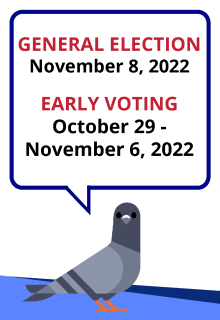
Early Voting begins Saturday, October 29 and runs through Sunday, November 6.
Find your Early Voting and General Election/Election Day pollsite (they’re not necessarily the same) and access a sample ballot at findmypollsite.vote.nyc/. You’ll need your house number, street name, and zip code. Chelsea locations include a building on the FIT campus and Selis Manor for the Blind. Below, find dates and hours for early voting and the General Election.
Early Voting: Oct. 29-Nov 6
Sat./Sun. Oct. 29/30: 9am-5pm
Monday, October 31: 7am–3pm
Tues./Wed. Nov. 1/2: 10am–8pm
Thursday, November 3: 10am–6pm
Friday, November 4: 7am–3pm
Sat./Sun. Nov.5/6: 9am–5pm
General Election/Election Day: Tuesday, November 8 / Polls are open 6am-9m
Note: The following info, we’ve taken from former Manhattan Borough President and current NYC Council Member Gale Brewer’s Oct. 27 “Update” Enewsletter. To subscribe, click here.
In addition to Governor, Lt. Governor, Attorney General, Comptroller, U.S. Congress, State Senate and State Assembly candidates, there are four proposals on the back of the ballot.
Proposal 1 is the statewide Environmental Bond Act, which authorizes issuing $4.2 billion in state bonds for environmental projects, 35% of which must be spent in “environmental justice communities.” Included in the spending, according to The Nature Conservancy, would be
- $1.5 billion for climate mitigation such as wetland protection and zero-emission school buses.
- $1.1 billion in flood risk reduction
- $650 million in open space land conservation and recreation
- $650 million in water quality and infrastructure improvement and Resilient Infrastructure
- $300 million unallocated
Read the complete Proposal 1 language at the link above; learn more about this proposal (and the history of environmental bond acts) from SUNY’s Rockefeller Institute here.
Proposal 2 amends the New York City Charter to add a preamble, an introductory statement of values and vision to the City Charter, aspiring toward “a just and equitable city for all New Yorkers”. Included in the preamble is a statement that the City must strive to remedy “past and continuing harms and to reconstruct, revise, and reimagine our foundations, structures, institutions, and laws to promote justice and equity for all New Yorkers.” The preamble is intended to guide City government in fulfilling its duties. The actual Charter preamble language is not on the ballot (only a summary is); read the proposed preamble in its entirety here.
Proposal 3 requires citywide and agency-specific Racial Equity Plans every two years. The plans would include intended strategies and goals to improve racial equity and to reduce or eliminate racial disparities; and
- Establishes an Office of Racial Equity and appoint a Chief Equity Officer to advance racial equity and coordinate the City’s racial equity planning process. The Office would support City agencies in improving access to City services and programs for those people and communities who have been negatively affected by previous policies or actions, and collect and report data related to equity; and
- Establishes a Commission on Racial Equity, appointed by City elected officials. In making appointments to this Commission, elected officials would be required to consider appointees who are representative of or have experience advocating for a diverse range of communities. The Commission would identify and propose priorities to inform the racial equity planning process and review agency and citywide Racial Equity Plans.
Read the actual Proposal 3 language here.
Proposal 4 amends the Charter to require the City to create a “true cost of living” measure to track the actual cost in New York City of meeting essential needs, including housing, food, childcare, transportation, and other necessary costs, and without considering public, private, or informal assistance, in order to inform programmatic and policy decisions; and requires annual reporting on the “true cost of living” measure. Read the actual Proposal 4 language here.
(There’s already a version of this index, the “True Cost of Living” that was conducted for decades by Merble Reagon, Executive Director of Women’s Center for Education and Career Advancement; the Fund for the City of New York is taking it over now that she’s retiring.)
—Compiled by Scott Stiffler
Chelsea Community News is made possible with the help of our awesome advertisers, and the support of our readers. If you like what you see, please consider taking part in our GoFundMe campaign (click here). To make a direct donation, give feedback, or send a Letter to the Editor, email scott@chelseacommunitynews.com.

You must be logged in to post a comment Login